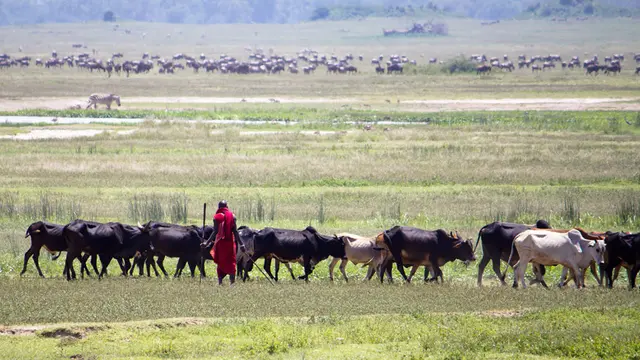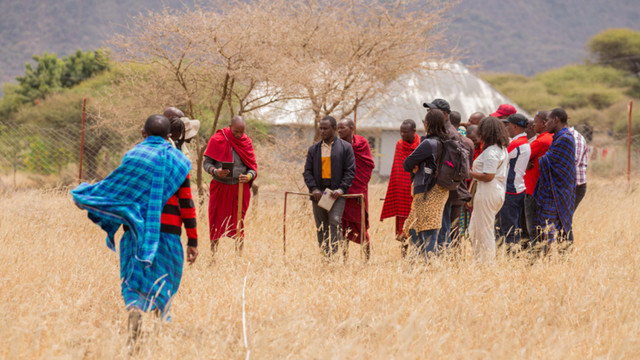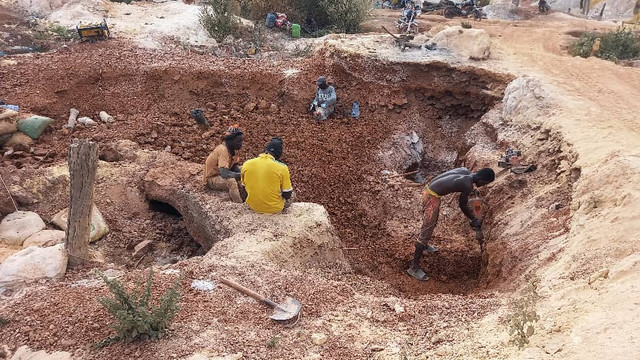Devolved climate finance approach forges new ways of working between citizens and state
Devolved climate finance programmes incorporate local knowledge and community priorities into decisions about how climate finance is planned and budgeted. At CBA12, practitioners will discuss the different components of these programmes, exploring the environment when they are most effective and why, and sharing experiences from several contexts.


Policymakers in Kenya meet with researchers and smallholder farmers to learn about locally appropriate solutions to climate change (Photo: Timothy Mwaura, CIGAR)
The governments of Mali, Senegal, Tanzania and Kenya are piloting devolved climate finance (DCF) approaches to fund climate change adaptation.
The pilots work by establishing mechanisms that funnel money for climate-resilient development through public financial management systems down to local governments. The approach depends on local communities collaborating with government to take the lead in planning and budgeting funds for adaptation.
This collaborative approach presents an opportunity to transform the relationship between states and their citizens by empowering communities to make meaningful investment decisions for their own future.
All four countries have adopted some form of decentralisation. In theory, the approach offers a framework for governance that gives more power to local governments. These bodies are much better placed to develop in-depth knowledge of available natural resources and the groups who use them, whose needs are driven by varied ecological environments and local political histories.
In short, these authorities are well positioned to respond quickly and effectively to the adaptation needs of local communities.
But in practice decentralisation has often only been partial. The process of devolving power is complex, with sections of national or regional governments often trying to hold on to authority or financial resources. This means that discretionary authority and the financial and technical resources to make smart, context specific, holistic decisions are not passed down in full.
Decisions about land or natural resource governance, for example, still need referral to national level sector ministries, or grants designed to respond to local needs are guided by centrally-set policies.
Devolved finance: drawing opportunities from risks
There are three interlocking reasons to drive uptake of the devolved approach:
- The impacts of climate change vary depending on particular socio-economic and ecological contexts. Understanding them and developing appropriate solutions requires specific, localised knowledge, and the flexibility to respond to changing priorities. Local government can access this knowledge and incorporate it to deliver what communities need to respond to the risks of climate change.
- These impacts undermine economic development, preventing climate vulnerable communities from lifting themselves out of poverty. New approaches such as DCF are needed now. Without change, countries face spiralling costs as agriculture becomes less productive, risks of climate-induced humanitarian crises intensify and communities migrate to pursue opportunities elsewhere.
- Relatively large sums are available for countries that can establish robust, transparent systems for transferring funds for resilient development through an effective, participatory process. USD $100 billion of climate finance – on top of existing official development aid – is promised per year, some of which countries can access through 'direct access' mechanisms.
These funds are easier to access if countries can demonstrate they will be managed with strong fiduciary standards, recognise gender imbalances and bring local communities into the development process.
Incorporating local knowledge to adapt effectively, coupled with the urgent need for new approaches and availability of new finance all make the clear case for advancing devolved processes to deliver climate-resilient development.
Why the devolved finance approach works: crucial collaboration
The success we are seeing in the roll-out of the DCF pilots in these four countries shows how collaboration is central to an effective climate change response.
Without active participation of local people, government initiatives will further marginalise vulnerable groups. And bypassing essential knowledge from the ground risks outright failure.
Furthermore, governments must recognise that people living in poverty have, independently, been managing risk, uncertainty and variability for generations. Putting them at the centre of development – in both planning and budgeting – will allow communities to build structures that recognise their experiences and local or customary knowledge to managing risk and sharing prosperity.
The devolved climate finance approach, by its very nature, empowers communities to lead the planning and budgeting process, with technical support from local government.
Through the work of the ADA Consortium in Isiolo, Kenya, communities determine how 70 per cent of a publicly-disclosed amount is spent in line with their priorities, while local government decides 20% of spend.
Driving change on the ground
Local government is bringing climate information services and technical services (such as water engineers) into community planning, enabling local people to make informed decisions about investing in their future. This is seeing the reinvigoration of customary resource governance institutions that use local knowledge, while water infrastructures are receiving much needed investment.
Preliminary evidence identifies improvements in quality and availability of ecosystem 'services', including water, food, seedbanks and reducing the potential for conflict.
In piloting these approaches, Mali, Senegal, Kenya and Tanzania are using climate finance to push forward with a devolved approach that is empowering citizens and encouraging governments to collaborate with different groups for climate-resilient economies that bring benefits on the ground.



